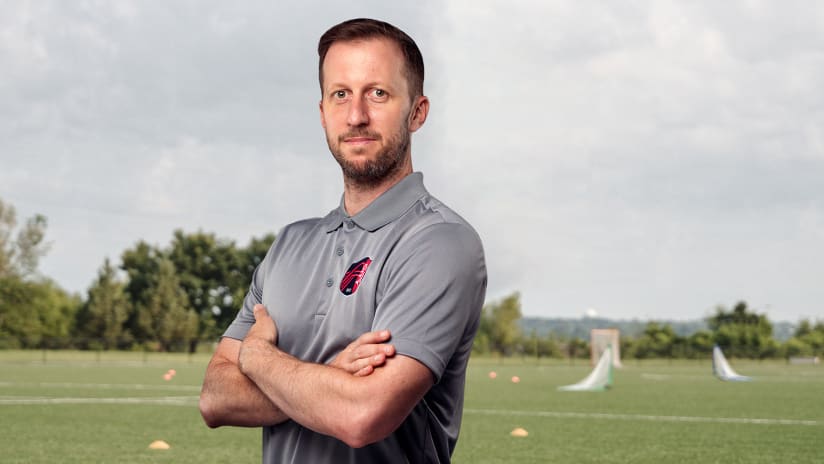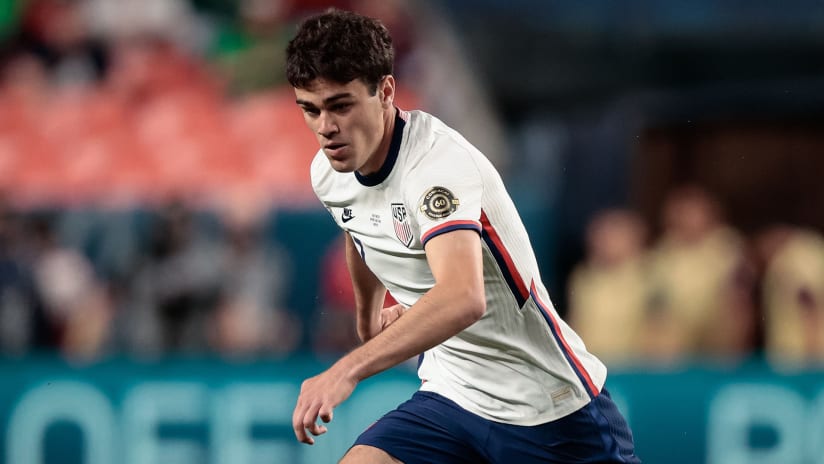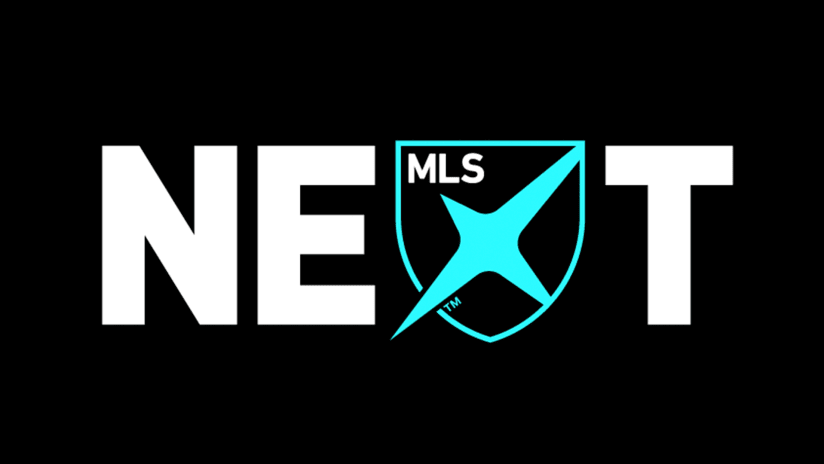Unless you spend a lot of time in and around FC Dallas or the national elite youth soccer scene, odds are you’re not too familiar with Luchi Gonzalez, the man the North Texas club promoted from academy director to become their new head coach this week.
His new post is his first at the senior professional level, and FCD is the only pro club he’s ever coached at. He knows that very well, and so do the rest of Dallas’ brain trust.
“Absolutely,” Gonzalez told MLSsoccer.com in a phone conversation over the weekend. “I’m inexperienced, I’m unproven – that’s life. That’s for any one of our players that are going to have a new experience, any one of our staff. In anything in this life, we’re going to be out of our comfort zones doing something different, doing something new. I can’t control that. I can only focus on what I can control and what I can influence.”
Luchi Gonzalez coaching one of FCD's academy teams | FC Dallas
MLS’s newest head coach is also its second-youngest, a former player in the league for three seasons from 2002-06 and a product of the modern American soccer landscape in which the league has survived and eventually thrived.
The son of an immigrant father and US-born mother, Gonzalez came of age in the rich futbol culture of South Florida – surrounded by “Colombians, Peruvians, Argentines, Brazilians,” he recalled, “soccer became my love” – and played alongside Taylor Twellman on the US side at the 1997 FIFA U-17 World Championship.
“My father’s from Lima, Peru; my mother is from Pennsylvania, she grew up in Chicago,” explained Gonzalez. “They met each other in Miami, Florida, in the early ‘70s. My father didn’t know English, my mother didn’t know Spanish. So I grew up in that kind of home.”
He went on to become a star NCAA striker under future FCD coach Schellas Hyndman at Southern Methodist University, winning the MAC Hermann Trophy, college soccer’s highest individual honor, before being selected by the San Jose Earthquakes in the 2002 SuperDraft.
Gonzalez’s pro career took him from San Jose to Columbus to Sweden and Peru, then back to MLS with Colorado – where he met his wife, Amal, now the mother to their 10-year-old daughter Giordana and 5-year-old son Liam – and eventually to lower-division sides Miami FC and Minnesota Thunder. After seven clubs in eight years, it was time for a new chapter.
“My pro career was very volatile, very unstable,” he recalled, “but I’m thankful for having that experience to travel the world and be humbled – and watch the game a lot from the sideline – and know that, ‘playing is not going to be a long-term thing for me, I think I need to think about my next step.’”
That led him back to Miami, where he coached youth soccer and taught high-school algebra, eventually climbing into a director’s role at Kendall SC, a prominent South Florida youth club. His work there caught the attention of FC Dallas’ leadership, who convinced him to return to Texas to join their burgeoning academy project in 2012.
“As I got into coaching, I just wanted to be a great teacher, of life and of the game, in the best way I could,” said Gonzalez. “I think that really helped me gain a love, gave me a foundation and a purpose of why I’m involved in this game and what’s my role in it.”
Six years later, FCD’s academy can boast four U.S. Soccer Development Academy national championships, an historic 2017 Dallas Cup Super Group championship and a veritable assembly line of Homegrown talent – with Gonzalez having coached 15 of the HGPs signed in that time. Today the club is synonymous with the “play your kids” movement, and his fingerprints are all over it.
But up until just a few weeks ago, Gonzalez was supposed to be taking charge of FCD’s new USL League 1 startup, North Texas SC, not the MLS side. Then Oscar Pareja decided to try a new challenge in Tijuana, and Clark and Dan Hunt asked Gonzalez to take part in the interview process as they searched for Pareja’s successor.
And when Gonzalez showed them an in-depth multimedia presentation that laid out his vision and strategies for the club’s future, it catapulted him to the top of a shortlist that included bigger names like US U-20 national team head coach and U.S. Soccer youth technical director Tab Ramos and longtime Gregg Berhalter assistant Josh Wolff.
He’s in no mood to celebrate anything yet, however.
“Being the first-team head coach now is just the next step,” said Gonzalez. “I never made it an ultimate objective, because I think that the micro pictures are more important, the micro steps. It’s OK to have an eye on the future, we have to, but I care more about how I live day-to-day.
“I’m not big on dreams – I’m not big on that. I’m big on taking steps and growing. I’m big on a process,” he added. “I don’t believe in luck, I don’t believe in dreaming; I believe in earning, Monday through Friday.”
His drive and attention to detail have been key in reaching this point in his career. But he also credits the cultivation of a life outside of soccer for keeping him sane along the way. With a musician brother and one of his closest college friends now an artist in New York City, he developed a taste for independent music, gallery shows and offbeat food, fashion, comedy and culture.
“That allows me to then be the best father and husband and coach I can be, because I have these other things that balance me, that stimulate me differently, that I can learn from,” he said.
Sounding every bit like a coach keen to polish rough diamonds into future superstars, Gonzalez proudly cops to having caught bands like Kings of Leon and Future Islands at small clubs, long before they were packing stadiums. He and Amal, who was a model when they first met, still try to catch up-and-coming acts before they become the next big thing.
Now he aims to build on Pareja’s legacy, maintaining FCD’s status as perennial MLS contenders while pushing the envelope on talent development. For those who know about his groundbreaking work at the academy level, Gonzalez’s ascension to the first team marks a watershed moment for a league which has finally gone all-in on the Homegrown philosophy which Dallas embraced as early, and as wholeheartedly, as anyone.
“Winning an MLS Cup will be our top priority, always, number one,” declared Gonzalez. “What we want to do is take that, evolve the playing style, evolve our identity and our game model, and then take that next step … This league is trying to create a market for its own players, Homegrown players, that you see in South America, that you see in Europe. So improving player values I think is a priority, so one day we can monetize our first team and monetize our academy based on developing the people we have and one day transferring them and supporting them in their next role – as Oscar’s going through, as other players have gone through.
“So finding that balance is the next challenge for myself and the staff.”











